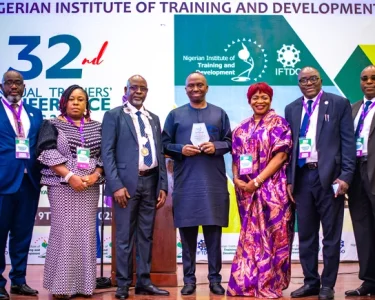For the second year, Boston Consulting Group (BCG)’s AI Radar global survey has captured the mood of business executives when it comes to AI.
The findings, released today, revealed both optimism and significant challenges in realising AI’s full potential. In the latest edition of the AI Radar report, titled From Potential to Profit: Closing the AI Impact Gap, BCG surveyed 1,803 C-level executives across 19 markets and 12 industries, including South Africa, Nigeria and Morocco.
Commenting on the survey, said Christoph Schweizer, CEO of BCG, “In my discussions with CEOs, it’s clear they are prioritising AI to drive productivity. Our latest survey uncovers a crucial challenge: while 75% of executives rank AI as a top three strategic priority, only a quarter report meaningful value from their AI initiatives.
Leading AI adopters have cracked the code on how to achieve impact by focusing on a targeted set of AI initiatives, scaling them rapidly, transforming core processes, upskilling their teams, and systematically measuring operational and financial returns. Many companies have an immense opportunity to close the gap between their ambitions and reality.”
Leading companies allocate more than 80% of their AI investments to reshaping core functions and inventing new offerings, while other companies focus 56% of their AI investments on smaller-scale, productivity-focused initiatives. Leaders also set clear goals and track top- and bottom-line impact.
However, 60% of companies surveyed are failing to define and monitor any financial KPIs related to AI value creation.
In Africa for instance, 35% of companies are not defining and monitoring any financial KPIs related to AI value creation. Sixty-two percent of these companies lack maturity in effective AI organisational change management, and 68% have indicated challenges hiring AI talent and upskilling their existing workforce.
Leading companies focus on depth over breadth, prioritising an average of 3.5 use cases, compared with 6.1 use cases for other companies. These companies anticipate generating 2.1 times greater ROI on their AI initiatives than their peers.
Agents are autonomous AI systems that achieve goals by using tools, analysing data, and working across systems-with minimal human input. While still in the early days of deployment, 67% of executives are considering autonomous agents as part of their AI transformation, with optimism around agents consistent across geographies.
At least 65% African companies surveyed have shown optimism about the role of AI agents moving into 2025, either exploring AI agents or viewing them as playing a central or complementing role in their AI transformation. African executives see talent and AI as complementary across all regions: 19% see AI taking the lead, but humans keeping oversight; 66% see AI and humans collaborating with complementary roles; and 15% are prioritising human talent and using AI only when necessary.
Sixty-eight percent of executives globally anticipate maintaining their current workforce size, focusing on enhanced productivity and upskilling existing talent to meet AI demands. That contrasts with the fact that fewer than one-third of companies have upskilled even a quarter of their workforce—an improvement from last year, but still far from the level needed to help employees feel secure in adapting to a technology often perceived as a threat to jobs.
In Africa, the report shows that only 6% of executives expect AI to lead to job losses. And, interestingly, 37% of these executives say that they see significant value from AI. This is supported by the finding that 86% of African companies are planning to increase tech investments in 2025, pushing for a more disruptive usage of AI, prioritising investments in higher-impact areas.
Asia-Pacific (34%) and Africa (31%) lead in AI/GenAI upskilling, while the Middle East (27%) and South America (20%) are falling behind.
Meanwhile, 17% of executives globally expect AI to reshape the workforce by introducing new roles to replace redundant ones. Eight percent foresee AI driving an increase in headcount, while only 7% predict a reduction in workforce size due to AI automation.
“Successful leaders adopt the 10-20-70 framework to unlock AI’s business potential, allocating 70% of their efforts to transforming people, processes, and culture; 20% to data and technology; and just 10% to algorithms,” said Sylvain Duranton, global leader of BCG X.
“However, two-thirds of companies face significant challenges in reimagining workflows, driving cultural change, recruiting talent, and upskilling their workforce. Ensuring the success of AI initiatives requires disciplined execution, a relentless focus on value creation, and a workforce ready to adapt and thrive in a rapidly evolving environment.”
Executives identified data privacy and security (66%), lack of control or understanding of AI decisions (48%), and regulatory challenges and compliance (44%) as the top three AI risks to navigate.
Cybersecurity is a critical concern, with 76% of executives acknowledging that their AI cybersecurity measurements require further improvements.
At least 64% of African executives surveyed have raised data privacy and security risks, 37% have highlighted the lack of control or understanding of AI decisions, and 46% are concerned with regulatory and compliance challenges.
Interestingly, the report reveals that 60% of African companies surveyed are starting to build their geopolitical muscle, citing regulations as a factor in their AI adoption pace. This is the highest across the globe, followed by North America (58%), Europe (56%), the Middle East (54%), APAC (52%) and South America (45%).
Companies across the region are not doing enough on the environmental impact of AI. The report shows that 73% of companies surveyed on the continent do not prioritise energy efficient AI solutions as part of their vendor selection.
This is against a global average of 78%, with other regions doing much less – South America at 86%, North America at 83%, the Middle East at 80%, Europe at 77% and Asia-Pacific at 75%.
The report is a good indicator of what needs to be done as a matter of priority and where AI should be headed across the region’s many economies and sectors.
It shows that 72% of African companies rank AI and/or GenAI as a top three strategic priority, against a 75% global average and that 83% of African companies recognise that their AI cybersecurity measures need further improvements.




